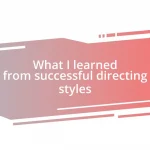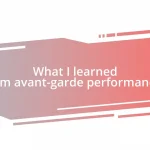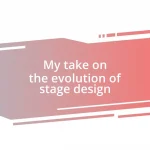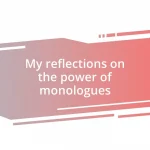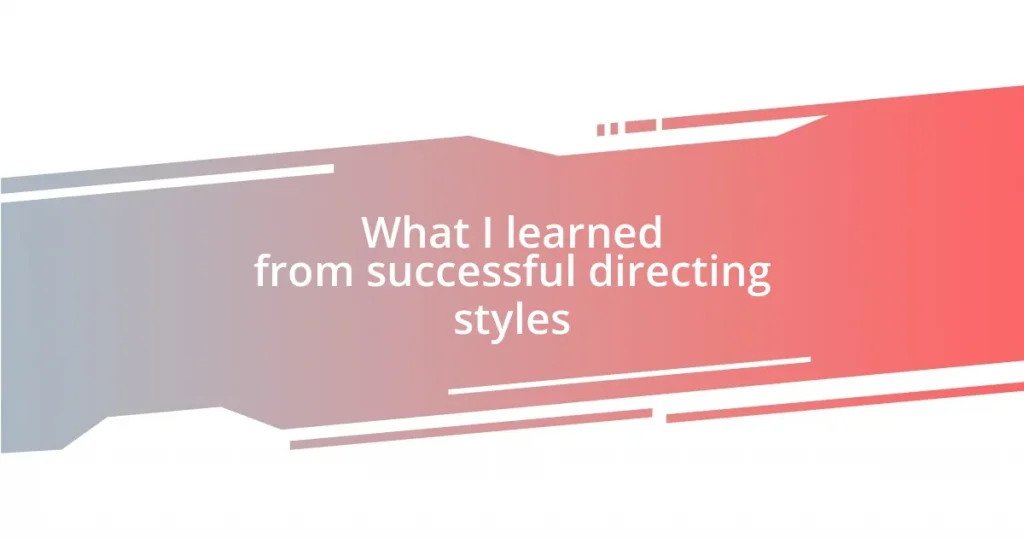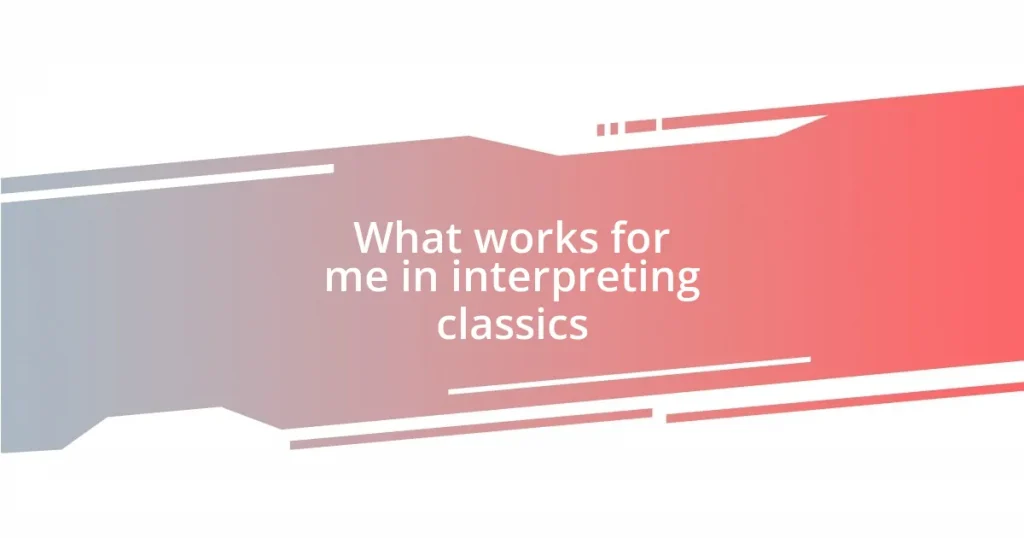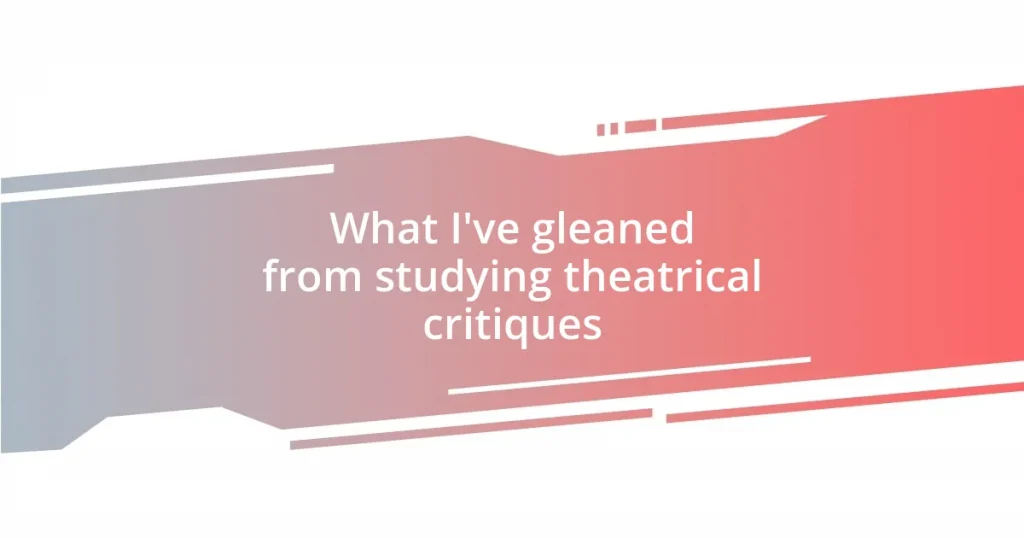Key takeaways:
- Understanding personal journeys shapes authentic writing voices through exploration and reflective growth.
- Key influences such as mentorship, literary exposure, and community engagement enhance and refine one’s unique voice.
- Experimentation with different writing styles and environments fosters creativity and reveals individual expression.
- Overcoming fears and embracing imperfections can significantly boost confidence in sharing one’s voice with others.

Understanding your personal journey
Understanding your personal journey isn’t just about the destination; it’s about every twist and turn that shapes who you are. I remember during my college years, I grappled with my identity while trying to find my voice in writing. It’s fascinating how, through countless late-night scribblings and revisions, I began to understand not just what I wanted to say, but who I wanted to be as a writer.
Reflecting on those formative experiences, I’ve come to realize that our journeys are often filled with moments of doubt. Have you ever felt that nagging thought that you’re not good enough? I certainly did after receiving critique on my work. But instead of discouragement, I learned to embrace these moments as opportunities for growth, which ultimately helped me develop a more authentic voice.
Every setback or challenge can be a stepping stone. I recall a time when a failed project felt like a dead end. Yet, looking back, it fueled my desire to experiment with new styles, leading to the unique voice I have today. Isn’t it interesting how our challenges can carve out the most profound parts of ourselves?

Discovering key influences on voice
Discovering the key influences on my voice has been an enlightening process. I remember reading various authors who resonated with me—some pushing me to explore deeper themes and others encouraging me to embrace playful language. During this time, I realized how different genres and styles shaped my understanding of storytelling. In fact, the moment I identified my favorite writers, it was like discovering hidden threads connecting my own thoughts and experiences with theirs.
Here are some key influences that have shaped my voice:
- Mentorship: Having a mentor who provided constructive feedback helped me refine my ideas and find my rhythm.
- Literary Exposure: Dipping into classic and contemporary works opened my mind to diverse writing styles and perspectives.
- Life Experiences: Personal challenges, from a difficult breakup to a triumphant travel adventure, have both enriched my narrative and added authenticity to my voice.
- Community Engagement: Interacting with fellow writers offered me varied viewpoints and encouraged collaboration, nudging me to articulate my thoughts more clearly.
- Cultural Background: My upbringing, infused with tales from my family, added depth to my storytelling, allowing me to weave in personal anecdotes naturally.

Identifying your unique style
Identifying your unique style often requires a deep dive into your preferences and experiences. I can recall flipping through my old journals and noticing how my writing evolved over the years. Each style phase mirrored my mood and life circumstances. It’s amazing how the simple act of writing—what I chose to convey and how I chose to say it—opened a doorway to discovering my true voice.
As I experimented with various formats, I stumbled upon a blend that felt authentically me. For instance, during a poetry workshop, I realized my inclination for vivid imagery and emotional depth rather than rigid structure. This moment was pivotal; it felt as if I had unlocked a treasure chest filled with the essence of my voice, one crafted from both instinct and reflection.
Exploring unusual subjects also honed my distinct style. I remember writing an article about the beauty in mundane moments—like watching a single raindrop race down a windowpane. Prioritizing these small details allowed me to cultivate a unique perspective. What about you? Have you found specific themes or moments that resonate deeply with your own style? Reflecting on these can be incredibly revealing.
| Influence | Description |
|---|---|
| Reading Widely | Exploring different genres exposes us to new styles and ideas. |
| Personal Experience | Your own stories and emotions add authenticity to your voice. |
| Engagement with Others | Collaborating and discussing with peers sparks fresh insights. |
| Trial and Error | Experimenting with various writing formats leads to discovery. |
| Reflection | Looking back on previous work helps to identify growth and evolution. |

Techniques to develop your voice
Finding and developing your writing voice is a journey that can be both exciting and daunting. One technique that really helped me was to mix up my writing routine. I remember a period when I dutifully stuck to my quiet desk every day, but the words felt stale. So, I tried writing in different locations—like my favorite coffee shop or even on a park bench. This shift in environment seemed to breathe new life into my creativity, sparking ideas that had previously eluded me. Have you considered changing your writing surroundings?
Engaging with other writers opened so many doors for me. There’s something about sharing work in a trusted group that invites fresh perspectives. I vividly recall attending a local writing circle where everyone shared their latest pieces. Listening to others discuss their interpretations made me reevaluate my own work. It not only highlighted areas I could improve but also inspired me to explore themes I hadn’t considered tackling before. Have you found a community or group that has helped you grow?
Lastly, I can’t stress enough the power of trial and error. When I first began writing, I stuck to conventional forms—essays, articles, you name it. But there was this one evening when I felt a pull to write a short story in a completely different style. The character I created was a quirky janitor with a knack for poetry, and I realized just how liberating breaking away from structure could be. That exhilarating experience taught me that experimenting could reveal facets of my voice that were waiting to be discovered. Have you dared to step outside your comfort zone? Embracing the unexpected could provide surprising clarity to your unique voice.

Gaining confidence in expression
Gaining confidence in expression often starts with recognizing our fears and insecurities. I remember my initial attempts at public speaking, where the mere thought of addressing an audience made my palms sweat. As I ventured into sharing my written pieces aloud, I felt a wave of vulnerability, but each experience chipped away at my self-doubt. Isn’t it interesting how the more we put ourselves out there, the more we realize our voice truly matters?
What struck me was how feedback, especially from trusted friends or mentors, transformed my perspective. Once, after sharing a piece that felt too personal, I braced myself for criticism. Instead, my friends celebrated my courage and authenticity. Their support fueled my confidence, igniting a desire to express myself even more boldly. Can you recall a moment when someone’s encouragement made a significant difference in how you communicated?
I’ve also found that embracing imperfections is crucial in gaining confidence. During one of my writing courses, I submitted a draft filled with errors and raw emotions. To my surprise, the instructor praised the authenticity of my voice over technical flaws. That realization—that vulnerability can resonate more deeply than perfection—encouraged me to embrace my imperfections instead of hiding them. Have you allowed yourself the freedom to express honestly, imperfections and all? It may just pave the way to a more confident expression.

Sharing your voice with others
Sharing your voice with others can be profoundly rewarding, but I’ve learned it often requires vulnerability. I remember the first time I read my work to a group of strangers at a writing retreat. My heart raced, and my voice trembled, but as I shared my story, I could feel the energy in the room shift. Their attentive faces reminded me that my words had weight, affirming my belief that sharing sparks connection. Have you ever felt that electrifying moment when your voice resonates with others?
When I began to share my writing more frequently, something magical happened—I found a community that echoed my thoughts and experiences. For instance, during an online workshop, I shared a piece about my struggles with identity. The heartfelt responses from fellow participants opened my eyes. Many shared their own struggles, creating an instant bond that showed me just how powerful my voice could be. Isn’t it remarkable how sharing your truth can inspire others to do the same?
Sometimes, I shy away from sharing due to fear of judgment. However, I’ve come to realize that my unique voice may just be the key to helping someone else. One afternoon, a friend reached out to me after reading an article I published about overcoming my insecurities. She opened up about her struggles, thanking me for the courage to share my story. In that moment, I understood that my voice not only mattered but could also be a lifeline for someone else. Have you ever considered the ripple effect of sharing your voice? The impact can be profound and far-reaching.

Overcoming challenges in voice development
Overcoming hurdles in voice development often comes down to confronting our inner critics. I vividly recall a workshop where I hesitated to share my thoughts, paralyzed by the fear that they weren’t good enough. But pushing through that discomfort opened the door to a new realm of expression, revealing that my perspective had value. Have you ever faced a moment where stepping out of your comfort zone led to unexpected growth?
Another challenge I encountered was the pressure to conform to others’ expectations. In my early writing days, I tried mimicking styles of authors I admired. It was exhausting and stifled my authenticity. By embracing my unique style, I discovered a freedom that allowed my true voice to emerge and flourish. Do you ever find yourself swayed by the opinions of others, rather than trusting your instincts?
Lastly, I learned that setting aside perfectionism is essential in voice development. There have been countless times when I held back my ideas, fearing they weren’t fully polished. However, when I started sharing rough drafts, I found that my audience often connected more with my raw, honest expression than with my cleanest work. This taught me that genuine vulnerability can create meaningful connections. Have you allowed yourself the luxury of sharing unfinished thoughts? Embracing that uncertainty could be the key to unlocking your unique voice.
